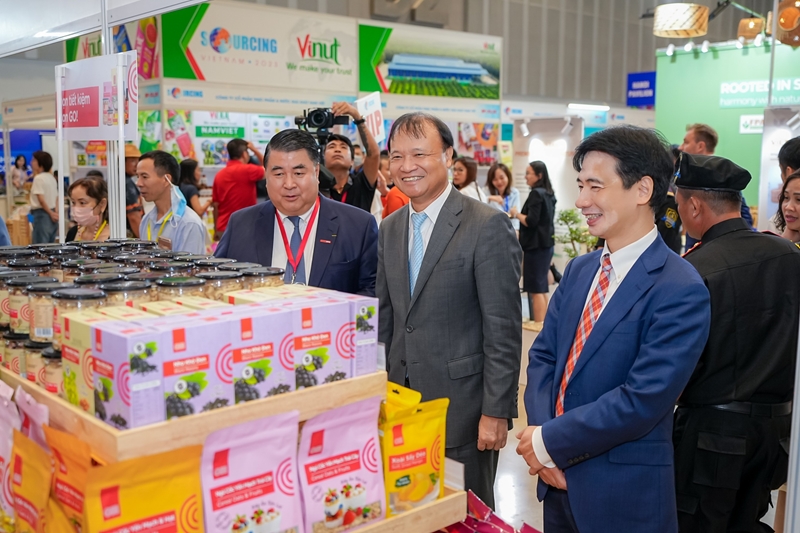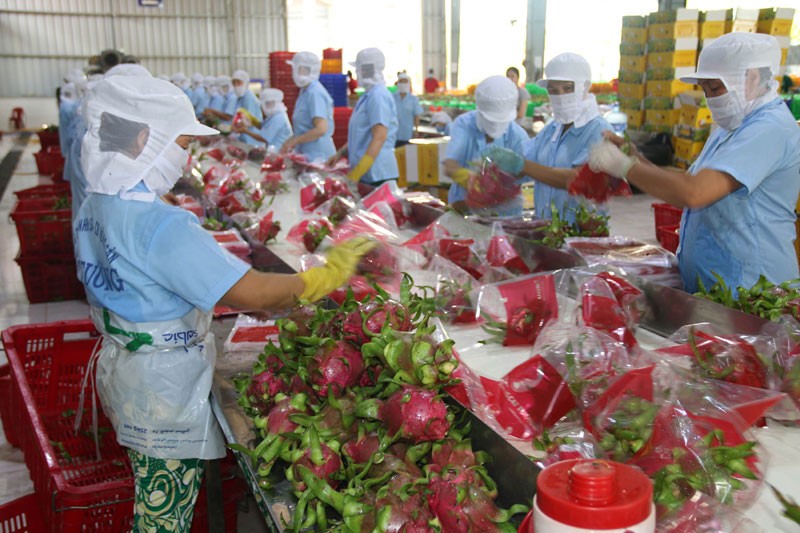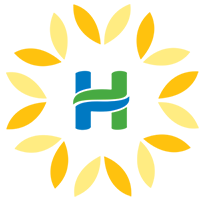Agricultures, Foods, News & Event
Bringing Vietnamese agricultural products and processed foods into foreign distribution systems
Quality is no longer an issue with Vietnamese agricultural products. Instead, the bottleneck that Vietnamese businesses are facing is environmental requirements.
There are many advantages
Talking to the News Newspaper, Mr. Vincent Gothknecht, Chief Representative of I.Schroeder Company (Germany) said that Vietnam has a great advantage in exporting agricultural products to the EU market thanks to the Vietnam Free Trade Agreement. – EU (EVFTA). Europe is a demanding market with many strict standards on food safety and hygiene, so businesses need to comply with these regulations. Specifically, products exported to this market must have clear traceability and must ensure environmental and labor requirements and standards…
Mr. Vincent Gothknecht also added that there are currently about 50 suppliers in Vietnam providing agricultural products such as lychees, pineapples, passion fruits and seafood to the company. Accordingly, product quality is no longer a problem for Vietnamese agricultural products. However, the bottlenecks that Vietnamese businesses encounter are mainly environmental requirements, emission reduction, carbon neutrality… Many buyers want suppliers in their supply chain to be carbon neutral. This means prioritizing green production. Therefore, if Vietnamese enterprises do not meet this standard, they will lose the opportunity to export goods to international markets.

A representative of MM Mega Market Vietnam Company said that each market will have different challenges and barriers, from technical to commercial, making it difficult for Vietnamese agricultural products to reach far. For example, in demanding markets such as the US and Europe, in addition to standard requirements from importers, Vietnamese goods such as dragon fruit, grapefruit, and coconut must ensure that pesticide residue does not exceed the limit. maximum allowed. In addition, the products provided must have the full growing area code and packaging facility code. Besides, importers are also interested in maintaining the best price on the market when purchasing… Besides the requirements for quality, size, and flesh color, they often require white-fleshed dragon fruit. .
Meanwhile, Mr. Paul Le, Vice President of Central Retail Vietnam Group, said that for many years, Central Retail has coordinated with the Ministry of Industry and Trade to organize “Vietnamese Goods Week in Thailand” to help businesses promote their products. brand, increasing sales opportunities into Thai distribution channels. Therefore, it can be seen that agricultural businesses that want to enter foreign distribution channels need to clearly understand market information. On the other hand, when participating in trade promotion and export connection programs, Vietnamese businesses should bring product stories instead of conventional products. Recently, there was a shrimp crackers product from a business in Ca Mau. Thanks to the story and initiative in introducing the shrimp crackers product, this product was chosen by distribution systems in Thailand to sell in the distribution channel their spouse.
“When Vietnamese agricultural enterprises have the opportunity to participate in fairs, they need to learn about the market, as well as prepare sources of goods to supply when foreign markets have demand. In addition, businesses also need to prepare clear and specific paperwork related to products so that partners do not waste time searching for product information when needed,” Mr. Paul Le added.
Pay attention to environmental regulations
According to Ms. Nguyen Thao Hien, Deputy Director of the European – American Market Department (Ministry of Industry and Trade), recently, Vietnam’s agricultural and food exports are having many breakthroughs, with export turnover of agricultural and aquatic products and food maintained double-digit growth rates. In 2022, Vietnam’s agricultural, forestry and fishery exports will reach 53.2 billion USD, an increase of nearly 10% compared to 2021. There are many commodity groups with a turnover of over 2 billion USD such as wood, seafood, and coffee. , rubber, rice, vegetables, cashew…
“Especially in 2022, many types of our country’s agricultural products such as fresh bananas, sweet potatoes, bird’s nest, grapefruit, longan, passion fruit, durian… will be licensed to export to developed markets with high standards. in the world such as the US, Japan, China, and New Zealand. This creates great opportunities for fruit exports. In 2023, in the context of many difficult markets, especially high inflation in all Among the main export markets, the export turnover of Vietnam’s agricultural, forestry and fishery products is forecast to still exceed 50 billion USD. Currently, Vietnam is a supplier in the Top 3 world of coffee. coffee, the first largest in cashew nuts, the first largest in pepper, the third largest in rice…”, Ms. Nguyen Thao Hien added.
According to Ms. Nguyen Thao Hien, among agricultural products, vegetables and fruits are one of the bright spots in our country’s export industries. Forecasting for the whole year of 2023, it is likely that fruit and vegetable exports will reach the historic milestone of 5 billion USD. Experts say that, in the context of global inflation, in 2023, China will still be an attractive market for Vietnamese agricultural products thanks to the booming demand after Covid-19 plus the advantage of a close geographical location. , making logistics costs and time risks lower than other markets.

“Therefore, if agricultural and processed food businesses want to reach out, they first need to promote their important leading role, not only guiding farmers to produce according to importers’ requirements, especially prioritizing Green products also need to comply with requirements on transaction culture and e-commerce. On that basis, people must follow certain procedures related to production commitments and contracts. product consumption… In the long term, currently, regulations on environmental protection in Vietnam’s main export markets such as the EU, North America and Northeast Asian markets are becoming increasingly stricter. Because Therefore, companies trading in wood, coffee, cocoa, rubber, soybeans, cattle, palm oil and derivative products in the EU must also prove that the goods they sell are not related to illegal activities. forests from after 2021. If violated, there will be a minimum fine of 4% of annual sales collected throughout the EU,” said Ms. Nguyen Thao Hien.
Similarly, Mr. Vincent Gothknecht also said that Vietnamese agricultural enterprises that want to export to the EU must first have food safety certification, environmental and labor standards certification… To do this, businesses required to invest quite a large amount of resources. But this is a mandatory requirement to enter the market. “The long-distance strategy may lose in the short term, but in the long term, businesses will definitely win. Because green economy and green agriculture are future trends. Vietnamese businesses that want to maintain export development must If you invest now rather than waiting, you will lose many opportunities,” said Mr. Vincent Gothknecht.
Green from production and farming.
Talking to Vneconomy, Mr. Tran Minh Thang, Vietnam Trade Office in the United States, compliance with food safety regulations is a prerequisite for bringing agricultural products and fruits into this market. This requires that the farming and growing process strictly comply with the regulations and requirements of the import market.
In addition, it is necessary to improve post-harvest preservation technology, ensuring uniformity in the process of preliminary processing, packaging, storage and transportation to stabilize the ideal temperature and humidity for fruit.
Considering that sustainable development of safe agricultural and food chains to meet demand and improve product competitiveness is extremely important today, Mr. Le Thanh Hoa, Deputy Director of the Quality Department, quality, processing and market development cum Director of SPS Vietnam Office emphasized that this is a requirement as well as a trend forcing businesses to transform.
In addition to the role of businesses, the State needs to improve legal and policy institutions, develop standards and technical regulations suitable to practice and integration.
Invest in resources and mechanisms to mobilize resources for management training, supervision, guidance and support to ensure food quality and safety at all stages from production, harvesting, preservation, processing and finishing. connecting domestic and foreign consumption.
At the same time, update regulations, market analysis information, and consumer tastes to develop and produce suitable products.
Implement projects to develop raw material areas; logistics system along the agricultural supply chain, ensuring food safety; Reduce post-harvest losses and improve the quality of agricultural, forestry and fishery products…
Along with that, innovate dissemination, training and support for people and businesses on quality management, food safety, technology application, digital transformation and digital channels connecting markets and consumers.

